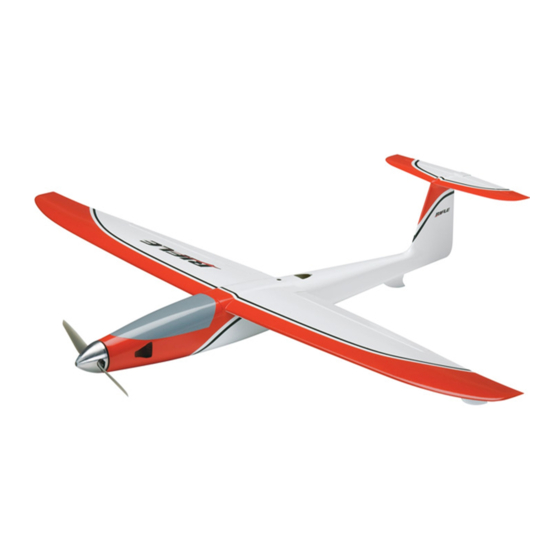GREAT PLANES Electrifly Rifle Instruction Manual - Page 16
Browse online or download pdf Instruction Manual for Toy GREAT PLANES Electrifly Rifle. GREAT PLANES Electrifly Rifle 16 pages.

Landing
The Rifl e doesn't land like most other airplanes. It won't fl y
slowly enough to make a proper fl air and you need to keep
the speed up to maintain aileron control authority to keep
the wings level.
When you're ready to land, throttle back early on the
downwind leg and allow the Rifl e to bleed off some of its
airspeed. Before the Rifl e makes its crosswind turn cut the
throttle completely and allow it to continue its descent toward
the landing zone. It will still be considerably far out and you'll
be looking at it almost head-on.
When the Rifl e is a foot or two [.3 - .6m] off the ground allow
it to continue a shallow descent with the fi rst priority to keep
the wings level. Continue to hold elevator until it eventually
catches the ground and skids to a stop—it usually doesn't
skid very far—just a few yards [meters] or so.
If, at any point during your landing setup you realize you
are coming in too fast, simply throttle up, go around and
try again. And if you're coming in too short, apply throttle to
stretch the landing.
After every landing closely inspect the model looking for any
damage. Replace the propeller if necessary.
16
Once over the flying field the Rifle prefers a long, shallow descent.
C.G. Marking Guide
Spare C.G. Marking Guide
LONG
After a few fl ights you'll have your Rifl e all trimmed out
for level fl ight and be executing perfect hand-launches,
adrenaline-pumping fl ights and smooth, routine landings
right at your feet.
One fi nal note about fl ying your Rifl e. Have a goal or fl ight
plan in mind for every fl ight. This can be learning a new
maneuver(s), improving a maneuver(s) you already know,
or learning how the model behaves in certain conditions
(such as on high or low rates). This is not necessarily to
improve your skills (though it is never a bad idea!), but more
importantly so you do not surprise yourself by impulsively
attempting a maneuver and suddenly fi nding that you've run
out of time, altitude or airspeed. Every maneuver should be
deliberate, not impulsive. For example, if you're going to do a
loop, check your altitude, mind the wind direction (anticipating
rudder corrections that will be required to maintain heading),
remember to throttle back at the top, and make certain you
are on the desired rates (high/low rates). A fl ight plan greatly
reduces the chances of crashing your model just because of
poor planning and impulsive moves. Remember to think.
Have a ball! But always stay in control
and fl y in a safe manner.
GOOD LUCK AND GREAT FLYING!
SHALLOW
This model belongs to:
Name
Address
City, State, Zip
Phone Number
AMA Number
